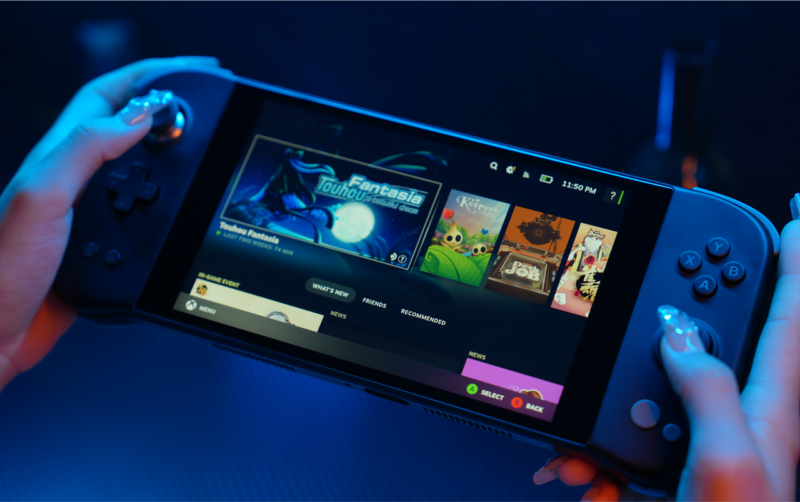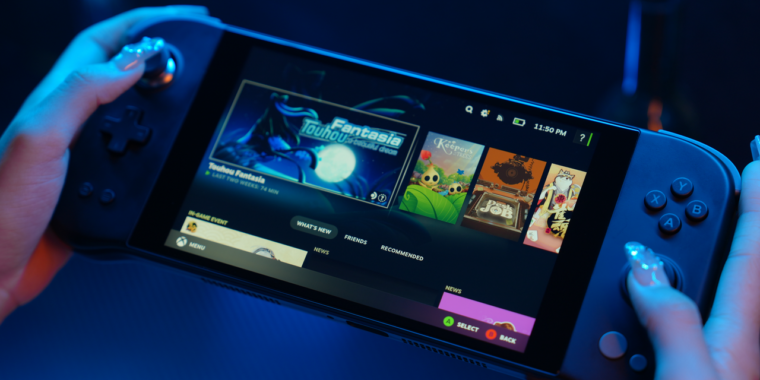Why more PC gaming handhelds should ditch Windows for SteamOS

Enlarge / Yes, that is SteamOS. No, that is not a Steam Deck.
Since the successful launch of the Steam Deck nearly two years ago, we’ve seen plenty of would-be competitors that have tried to mimic the Deck’s portable form factor and ability to run PC games. Thus far, though, these competitors have all been missing one of the Steam Deck’s best features: integration with the increasingly robust, Linux-based SteamOS 3.
That’s finally set to change with the just-announced Ayaneo Next Lite, the first non-Valve portable hardware set to come with SteamOS pre-installed. We can only hope this is the start of a trend, as Valve’s gaming-focused operating system brings many advantages over gaming portables (and maybe desktops) that run a full Windows installation.
A bespoke, portable gaming OS
Ayaneo’s announcement highlights a few vague-ish features of the Next Lite, including a 7-inch 800p screen, a 47 Wh battery, and drift-resistant hall-effect joysticks. But even though the announcement doesn’t include a specific asking price, Ayaneo promises that the device “integrates outstanding cost-effectiveness” and will be “the all-new cost-effective choice with flagship experiences.”
That ad copy highlights one of the main advantages a SteamOS-based gaming portable brings over one sporting Windows: cost. Sure, OEMs are likely paying much less than the $139 consumer asking price for a copy of Windows 11. Still, even a $70-per-unit bulk license would represent a good 10 percent of the ASUS ROG Ally’s $700 asking price (and an even bigger chunk of the price difference between the Ally and the Steam Deck). In an increasingly competitive portable PC gaming market, being able to cut out that significant cost over Windows-based alternatives could be a big deal.

Enlarge / Look how happy not paying for a Windows license has made these gamers.
Then there’s the interface. Modern Windows is designed with a desktop/laptop or tablet form factor in mind. That UI definitely leaves something to be desired when forced into a 7- or 8-inch touchscreen that lacks a keyboard and mouse. Our review of the ROG Ally highlights just how annoying it can be to have to fiddle with Windows settings on a touchscreen running “an awkwardly scaled” version of the OS. And while Microsoft has experimented with a handheld-friendly version of Windows meant for portable gaming devices, nothing public has yet come of the effort.
SteamOS 3, on the other hand, has been built from the ground up with portable gaming on Steam Deck in mind. That comes through in many little ways, like a built-in “suspend” mode, tons of battery-optimization features, and menus that are designed for a small screen and joystick navigation.
And let’s not forget the way that most Steam games are pre-configured and optimized to “just work” on the OS after you download them, eliminating the kind of settings tweaking that’s often needed when running Windows on a gaming portable. As Ars’ Kevin Purdy summed it up in his ROG Ally review, “I find it easier to install, launch, and configure games on Valve’s Steam Deck, a handheld PC rooted in Arch Linux, than on the Ally’s combination of Windows 11 and Asus’ own Armoury Crate software.”
Who needs Windows?
Enlarge / A mess of launchers and OS cruft crowd the screen when launching The Witcher 3 on the ROG Ally.
Kevin Purdy
Yes, a Windows installation means a gaming portable is compatible with almost every PC game ever made, including many that still don’t run on SteamOS for one reason or another. But SteamOS’s robust Proton compatibility layer means an ever-expanding list of thousands of games are certified as at least “Playable” on SteamOS, including most of Steam’s most popular titles. That’s a huge change from the desktop-focused “Steam Machines” era of the mid-’10s, when early versions of SteamOS could only run the relative handful of games that developers bothered to explicitly port to Linux.
While Proton does come with at least some performance overhead, a variety of Steam Deck benchmarks show games running under SteamOS tend to perform comparably (or sometimes better) than those running under Windows on the handheld. That’s also a huge change from the Steam Machines era, when Ars’ testing showed that many SteamOS games ran significantly worse than their Windows counterparts on the same desktop hardware.
Why more PC gaming handhelds should ditch Windows for SteamOS Read More »
